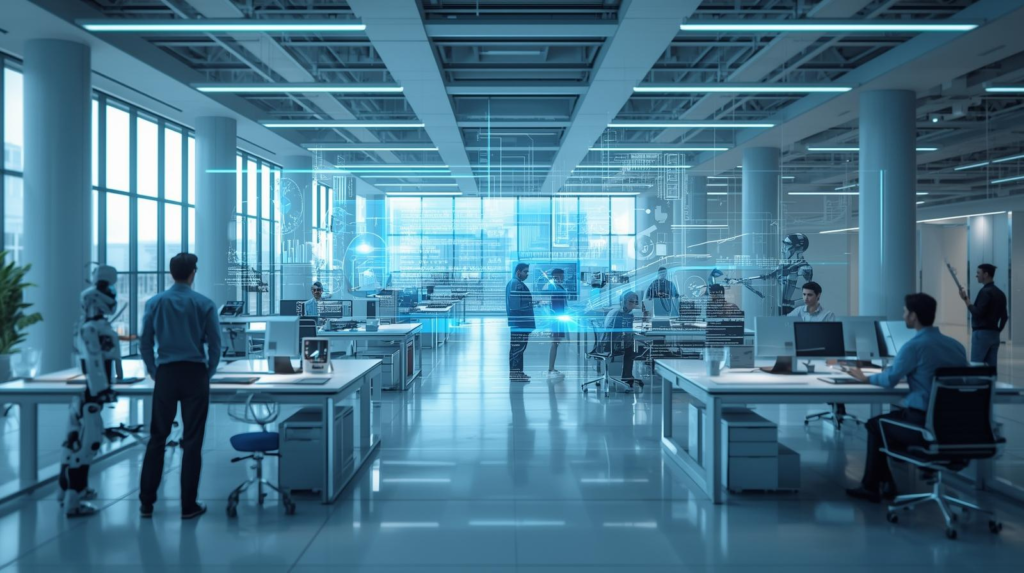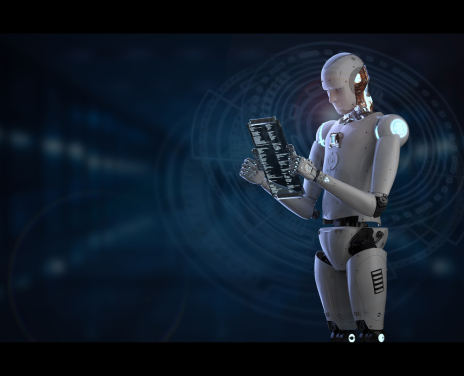
The modern AI-powered workplaces is undergoing a massive transformation. With artificial intelligence entering every sector, the question many professionals ask is: Will AI replace human jobs, or will it redefine them? The truth lies somewhere in between. Instead of focusing only on fears of job loss, organizations are exploring the impact of AI on future workplace and human jobs, where automation complements human skills rather than eliminating them.
At AixCircle, we believe AI is not just replacing roles—it is reshaping them, creating a new era of productivity, creativity, and collaboration.
Introduction: The AI Shift in Workplaces
Just a decade ago, AI seemed like futuristic science fiction. Today, it powers emails, chatbots, project management tools, and even hiring decisions. The rise of AI-powered workplace trends is changing how organizations hire, train, and operate.
The impact of AI on future workplace and human jobs is not just about robots taking over; it’s about rethinking how humans and machines collaborate to achieve better outcomes.
Impact of AI on Future Workplace and Human Jobs
The impact of AI on future workplace and human jobs is a hot topic in boardrooms and classrooms alike. While automation can handle repetitive tasks like data entry, report generation, and scheduling, humans bring creativity, empathy, and critical thinking—skills AI cannot replicate.
Here’s how the shift is unfolding:
- Job Replacement: Some routine-based jobs are being automated.
- Job Transformation: Existing roles are evolving with AI support.
- Job Creation: Entirely new roles in AI development, data ethics, and automation oversight are emerging.
This balance demonstrates that the AI impact on jobs in 2025 will be a mix of opportunities and challenges.
AI-Powered Workplace Trends Reshaping Industries
The adoption of AI-powered workplace trends is visible across industries:
- Human Resources & Recruitment: AI scans resumes, predicts cultural fit, and shortlists candidates.
- Customer Service: Chatbots provide 24/7 support, reducing response times.
- Finance: AI automates fraud detection, risk analysis, and compliance monitoring.
- Healthcare: Automation supports diagnostics, patient management, and scheduling.
These AI-powered workplace innovations are not replacing professionals but enhancing their effectiveness.
Future Workplace with AI: Collaboration, Not Competition
The future workplace with AI is not about humans versus robots. Instead, it is about collaboration. AI tools are designed to take on repetitive, data-heavy tasks, giving employees more time to focus on strategic and creative work.
Examples include:
- Project Management: AI predicts deadlines and resource requirements.
- Collaboration Tools: Platforms like Slack and Microsoft Teams integrate AI assistants to improve productivity.
- Learning & Development: AI personalizes training modules for employees, speeding up reskilling.
This synergy underscores the artificial intelligence and the future of work narrative: AI augments human capability rather than erasing it.
AI and Human Job Replacement: A Balanced View
The debate around AI and human job replacement often focuses on job losses. However, history shows that every technological revolution—industrial machines, computers, the internet—has created new opportunities alongside disruptions.
AI is no different. Yes, some roles will fade, but others will emerge, including:
- AI Trainers: Professionals teaching models how to adapt.
- Ethical AI Officers: Ensuring automation aligns with fairness and compliance.
- Human-AI Interaction Designers: Creating tools that bridge the gap between humans and algorithms.
Thus, while AI impact on jobs in 2025 may unsettle some, it also promises a future where technology and people grow together.
AI-Powered Workplace Innovation in Action
Companies worldwide are adopting AI-powered workplace innovation to achieve competitive advantages:
- Google: Uses AI to optimize workflows and resource allocation.
- Accenture: Deploys AI to personalize employee learning paths.
- TCS (India): Implements AI-driven automation for IT management, cutting costs and downtime.
- Coca-Cola: Employs AI to predict customer preferences and optimize marketing campaigns.
These examples show how workplace innovation through AI is not only efficient but also profitable.
Artificial Intelligence and the Future of Work: Human-Centric Transformation
When we talk about artificial intelligence and the future of work, the focus should shift to human-centric transformation. AI isn’t about sidelining people—it’s about empowering them.
- Employees gain freedom from mundane tasks.
- Organizations benefit from higher productivity and better decision-making.
- Customers enjoy faster, personalized services.
This human-AI collaboration is the foundation of the future AI-powered workplaces, where humans stay at the center of innovation.
Reskilling: Preparing for the AI-Powered Future
One of the most significant aspects of the impact of AI on future workplace and human jobs is the need for continuous reskilling. To remain relevant, employees must develop skills like:
- AI Literacy: Understanding how AI works and where it applies.
- Emotional Intelligence: Leading and collaborating in ways machines cannot.
- Analytical Thinking: Interpreting AI-generated insights.
- Digital Adaptability: Learning to work with evolving AI tools.
At AixCircle, we emphasize that AI-powered workplace trends will reward individuals who embrace learning and adaptability.
AI Impact on Jobs in 2025: Predictions
The AI impact on jobs in 2025 will be visible in three main ways:
- Automation of Routine Tasks: Admin and back-office functions will shrink.
- Hybrid Human-AI Roles: Marketing, HR, and operations will blend automation with human judgment.
- New AI-Centric Careers: From algorithm auditors to AI ethicists, fresh opportunities will arise.
This transformation cements the idea that the future workplace with AI is not about replacement but redefinition.
Challenges Ahead: Automation and Ethics
While AI and human job replacement is a concern, the larger challenge lies in ethics and fairness. If not managed properly, AI could amplify bias or create inequalities in hiring and promotions. Businesses must establish frameworks for:
- Transparency in AI-driven decisions.
- Fairness in recruitment and promotions.
- Data security and employee privacy.
Balancing workplace innovation with responsibility is key for long-term trust in artificial intelligence and the future of work.
Conclusion
The impact of AI on future workplace and human jobs is undeniable. But instead of framing it as humans versus machines, we must view it as a partnership. AI-powered workplace innovation will free employees from repetitive work, create new roles, and push organizations toward smarter decision-making.
At AixCircle, we see the future workplace with AI as an opportunity to redefine—not replace—human jobs. The coming decade will reward businesses and individuals who embrace reskilling, adapt to AI-powered workplaces, and harness artificial intelligence and the future of work for sustainable success.

